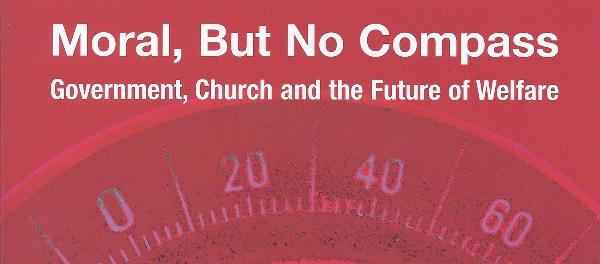Over the last eleven years, it has often seemed that there is rather cosy relationship between the Labour Government and the Church of England. Deeply imbued with the weltanschauung of Archbishop William Temple’s “Christianity and Social Order” (1942), rather than the Conservative Party at Prayer, the Church of England has appeared to stand in respect of social policy as an ecclesiastical expression of the Social Democrat/Socialist coalition that is New Labour. Yet the fault lines in this axis that are exposed by Francis Davis, Elizabeth Paulhus and Andrew Bradstock in Moral, But No Compass, the report of Cambridge University’s Von Hugel Institute for the Archbishop’s Council of the Church of England, are so deep and so wide as to call into question whether that axis can itself survive.
Set the task of looking at the current contribution of the Anglican Church to the policy making and provision of social welfare in England and of assessing the capacity of the Church to play a part in the reform and delivery of this area of public life, the Von Hugel team spoke to an enormous range of people. Parliamentarians and civil servants, ministers and community activists were consulted and the views of clergy and academics, charities and representative bodies were sampled. What this exercise revealed was a widespread mismatch between the Church of England’s expressed understanding of its relationship to the welfare state and the reality of life on the ground in parishes and dioceses. Whereas the prophetic charism of the Church in social policy was often stressed in terms that rejected any involvement in the delivery of that policy, in point of fact that prophetic role was often little more than a fig-leaf to cover the cosy acceptance of the nostrums of statist welfare provision supported by high central taxation.
The report reveals that the established Church is deeply involved in the support and provision of activities at the heart of welfare but that it has little notion of the extent and importance of that work. For the Catholic reader of the report, the identification of “the Church” with the institutional activity or clerical voice of that Church was deeply suggestive of an ecclesiology that failed to recognise the essential secularity of the lay vocation and that when services are supplied or policy is made by individuals who are part of the Church, that is a proper expression and outworking of the life of the Church.
But the report’s most devastating criticism is reserved for the other half of the Church-State axis. That three government departments could admit, without a hint of chagrin, that they possessed no evidence as to the extent of Christian churches’ involvement in or capacity to contribute to social policy in England beggars belief, but this pales into insignificance when one Government department couldn’t even see why such information would be necessary or even useful. The refusal by, amongst others, the Charity Commission to recognise the faith related dimension of many charitable bodies whose activities are those of feeding the hungry, clothing the naked, caring for and educating the widow, the orphan and the migrant, simply compounds the problem. And whilst the report recognises a general willingness at ministerial level to engage with the so-called faith communities, the sheer incomprehension and lack of curiosity expressed by officials in central and local government about the activities of the churches in this area, and of the beliefs that underpin those activities, give the lie to ministerial intent.
What Davis et al. reveal is that the notion “that the state should own and directly deliver all services” is at the heart of both the political and bureaucratic orthodoxy under New Labour and that the voluntary provision of those services is tolerated, if at all, purely on terms set by the State. They find an open hostility to the idea that the tenets of a faith might have a positive contribution to make in determining how those services might be delivered – a hostility expressed even by representative bodies such as the National Council for Voluntary Organisations – and a refusal to recognise that “Christian churches have founded and run more schools, orphanages, hospitals and community projects than the UK state”. As the report suggests, there is a powerful need for the Church of England to challenge this orthodoxy, to challenge it hard and to challenge it now.
There is more than enough in this report to keep a reviewer busy beyond the proper confines and word limits of a review such as this. Nevertheless, the cautious welcome in the report for the developing recognition within the Conservative Party of the capacity for the voluntary sector in general and the Churches in particular to be a key player in social policy and service delivery must not go unremarked. That the Opposition sees that contribution as being one that is not only convenient and necessary but also beneficial and properly autonomous – entitled to be governed and delivered in accordance with the lights of faith – is, in my view, encouraging, though, as the report suggests, it remains to be seen whether the Conservative Party could turn their words into policy action if they were to regain office. It might just be the beginning of a conversation in which the mainstream Christian churches, the Church of England and the Catholic Church in particular, reclaim both their voices and their proper role, such that never again can the county council equalities officer, quoted on p17 of the report, have any justification for saying “churches are just not good for society”.
Stephen Morgan is Chairman of the National Conference of Diocesan Financial Secretaries. He is a Deacon, and Head of Finance and Property in the Catholic Diocese of Portsmouth.
![]() Moral, But No Compass - Church, Government And The Future of Welfare from Matthew James Publishing
Moral, But No Compass - Church, Government And The Future of Welfare from Matthew James Publishing






